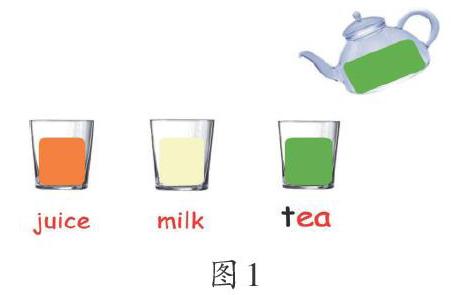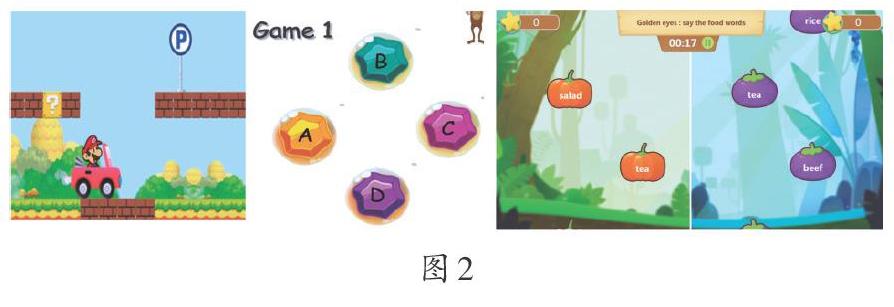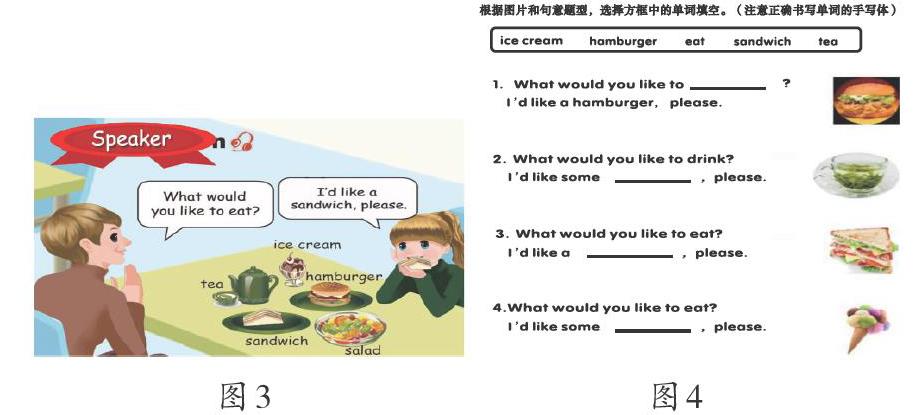Unit 3 What would you like? Part A Let’s learn 教学实录与评析
吴玉伟 李丽清



本课为人教版小学英语(三年级起)五年级上册第三单元的内容,场景设置是孩子和父母在家用餐和在餐厅点餐,内容是谈论各自喜爱的食物和饮品。本课分为两部分:第一部分要求学生能够听、说、读、写5个食品饮料单词;第二部分要求学生在语境中能够正确运用这5个单词点餐并填写菜单。执教老师运用“五步教学法”词汇课教学模式,将多媒体信息技术融入教学,激发学生的学习兴趣,很好地达成了教学目标。
一、新课导入:创设情境,引出话题
1.Greeting
T:Good morning boys and girls!
Ss:Good morning,Miss Wu!
T:Nice to meet you!
Ss:Nice to meet you,too!
2.Sing a song
T:(播放音乐《健康歌》:Drink some water. Drink some water. Eat some fish. Eat some fish. Have some rice. Have some rice. Cut the cake...)Do you like the song?
Ss:Yes!
T:Now,let us sing together!Sing and do the actions!
【评析】恰当的教学导入能够有效地激发学生的学习兴趣。执教老师利用学生熟悉的音乐《健康歌》,换成饮食类短句填词,将其改编为与学习主题相关的歌曲,不仅激活了学生的旧知,还拉近了师生之间的距离。
3.Review the words and sentences
What would you like?—Water/fish/rice/cake/chicken/soup/juice
T:Boy!What would you like?
S1:Id like some fish.
T:Me,too. So,today we will learn unit 3 What would you like?Part A Lets learn. Open your book on page 25.(板书课题)
T:We can see lots of food in the picture. At Miss Wus party,we also have lots of delicious food.(课件出示一桌美味的食物)Do you want to come?
Ss:Yes!
T:(出示与孩子们在聚会中合拍的照片)OK!Lets PK to get the party gifts. Youre CC Team. Youre DD Team.Welcome to Miss Wus party!This is for you.Can you say the words?
S1:Chicken.
S2:Soup.
Ss:Milk.
…
【評析】执教老师创设情境“Miss Wus party”引出本课话题,并将旧知的复习与新知的学习融入情境当中。
二、新知呈现:运用技术,教授新知
1.Teaching the new words and sentences:salad;What would you like to eat/drink?Id like some...
T:Pay attention
—To the food. We can ask:What would you like to eat?
—To the drinks. we can ask:What would you like to drink?
—The answer is:Id like a/some...,please.
Ss:What would you like to eat?Id like a/some...,please.What would you like to drink?Id like a/some...,please.
T:(板书What would you like to eat/drink?)In the party,we need more food. Lets go to the kitchen. Watch the video,learn the new word“salad”.(播放老师在厨房做沙拉的视频)
【评析】执教老师播放老师在厨房做沙拉的短视频,在视频中呈现新单词“salad”,既满足了学生求新求异的欲望,激发了学习兴趣,又为学生创设了一种美好的视听体验。
2.Teaching the new words:hamburger;sandwich;ice cream;tea.
T:Id like to eat more food. How about hamburgers?
Ss:Yes!
T:Me,too. But I cant make it. Lets order some hamburgers.(课件出示美团外卖点餐)
T:Is it a hamburger?(擦除显现)sandwich(拖动克隆),sandwiches.
【评析】执教老师利用时下流行的美团外卖点餐来呈现新单词“hamburger、sandwich”,体现了知识与生活的密切联系,同时借助白板技术的擦除显现、拖动克隆等功能来巩固新单词的记忆。在突破hamburger这个单词的读音时,执教老师运用TPR结合单词音节解决发音困难的问题,帮助学生高效识记单词。
T:Its time for dessert.(魔术布变出)Ice cream.
S1:Ice cream.
T:(板书ice cream)What would you like to eat?
S2:Id like some ice cream,please.
T:Im full,but I need something to drink. Look,what would Miss Wu like to drink?
T:(聚焦颜色,播放水流动的声音)What colour is it?(如图1)
S1:Orange.
S2:Juice.
Ss:Orange-juice;White-milk;Green-tea.
T:(现场喝一口茶)Id like some tea. What about you?Talk with your partner.
生生之間谈论自己喜爱的饮品。
T:Who can share it to us?
S1:What would you like to drink?
S2:Id like some juice,please.
S1:Sure,here you are. What would you like to drink?
S3:Id like some milk and tea,please.
S1:Oh,nice try. Here you are.
T:What would you like to drink?
S1:Id like some tea and juice,please.
T:OK,here you are. Taste it!You have your own idea.
三、巩固练习:善用技术,扎实学习
T:You like hamburgers. I like some tea. Lets have a look,our good friend,Sarah,what would Sarah like to eat?
S1:Sarah says,Id like a sandwich,please.
T:Thats right. Now,let us read after the tape.
S2:...
T:Good pronunciation!In the party,we had much food and drinks. Lets relax.Move!Move!Lets play some games.(出示动图,学生自主选择)
Game 1:Golden eyes
Say the food words.(各小组选一名学生代表玩游戏,两组进行比赛,小组成员为本组读出单词,如图2)
Game 2:Speaker
Read the text and see which group can read more fluently.(如图3)
Game 3:Writing
Do some exercises.(使用同屏批注,如图4)
T:Oh,the last game!
Game 4:Superstar
Role-play(group work)
T:(带上服务员的帽子,穿着围裙,拿着托盘,给出菜单)Im the waitress. Youre the customer.
W:Can I help you?
Ss:Yes.
W:What would you like to eat?
Ss:Id like a hamburger,please.
W:What would you like to drink?
Ss:Id like some tea,please.
W:OK,Here you are.
Ss:Thank you!
T:Understand?
Ss:Yes.
T:Group work. One act like waiter. Others act like customer.
Ss:OK.
生在小组内进行角色扮演,练习对话,用上彩色词卡。
T:(Four minutes later)Who can show?
师摆出餐桌、饮品、仿真食物、餐单,生练习表演对话。
T:You are the superstars.
We used the sentence in our daily life.
T:Well.Miss Zhao cant come to our party. Now,lets call her.(微信视频)
Ss:Hi,Miss Zhao!
Tzh:Hi,students.
Ss:You didnt come to our party. Lets share it.What would you like to eat?
Tzh:Id like a hamburger.
Ss:What would you like to drink?
Tzh:Id like some tea.
Ss:OK,well pack the food for you after class.
Tzh:Thank you,kids!
【评析】《义务教育英语课程标准(2011年版)》指出:教师要帮助学生有效地运用学习策略,提高学习效率,形成自主学习能力。教学中,执教老师引导学生与他人合作完成学习任务,提高了学生英语听说能力。热爱游戏是儿童的天性。因此,执教老师运用Golden eyes、Superstar等游戏形式展开教学,寓教于乐,体现了课程标准倡导的“让学生在乐中学,学中乐”的理念。执教老师对文本進行重构,为学生提供道具、实物、情境,为学生提供展示的平台,有助于学生拓展思路,灵活运用目标语言进行表达。
四、总结评价:巧用技术,保持乐学
1.Emotional education
T:Were very happy today,but we dont eat like this!
【评析】执教老师在小结本课教学的同时渗透情感教育,让学生意识到珍爱粮食是一种可贵的品质,餐桌礼仪是重要的修养,合理饮食有助于我们的身心健康。
2.Summary
T:Funny Peppa Pig,follow him.
Ss:Salad;hamburger;sandwich;ice cream;tea;What would you like to eat/drink?Id like some...
T:Exciting part comes,which team will get the gift?Open it and read it out.
S1:We can have a dinner with our English teacher.
T:Thanks for coming our party!
【评析】执教老师利用学生熟知的动画卡通小猪佩奇及音乐,让学生跟着小猪佩奇小结本课所学的知识,不但做到了首尾呼应,而且进行了总结、提升。
五、作业拓展
1.Listen and read the text for 3 times.
2.Finish the order and use it to make a video then share it with your friends.
【评析】作业是对所学知识加以巩固和运用的手段。作业拓展环节将口头作业与笔头作业相结合,开拓了学生的思维,培养了学生的语用能力。
【总评】
在英语教学中,随着词汇难度的增加,学生会慢慢失去学习的兴趣和积极性。执教老师运用多媒体信息技术,为学生创设语言情境,活跃课堂气氛,同时制定教学主线,使学习活动始终围绕教学主线展开。比如,开课伊始复习旧知,顺利进入学习主题,为引导学生快速进入学习情境,制作了自己在厨房做沙拉的视频。
借助多媒体信息技术辅助教学是这节课的亮点。执教老师根据教学目标设计课件,将抽象的知识具体化、直观化,让学生在愉悦的氛围中学习新知,很好地突破了教学难点,突出了英语教学对学生听、说、读的能力培养,使学生能够快速记忆单词,实现情景对话练习。授课中,执教老师使用了一体机互动游戏,运用了及时反馈、拖动、克隆等功能,为教学节省了时间,实现了课堂教学的智能化,也增加了课堂教学的趣味性。
词汇课是小学英语教学的主要课型之一。教师要善于运用多媒体信息技术辅助教学,在教学中渗透学习策略,培养学生的语用能力,提升学生的思维品质。
(注:本课例在2018年全区中小学信息技术与学科教学深度融合优秀课例展示观摩评选活动中获一等奖)
(责编 欧孔群)

